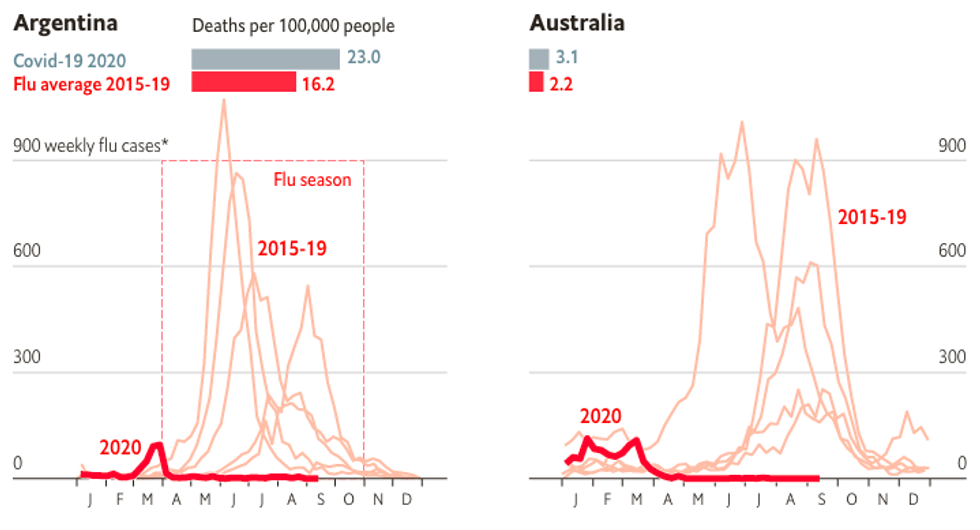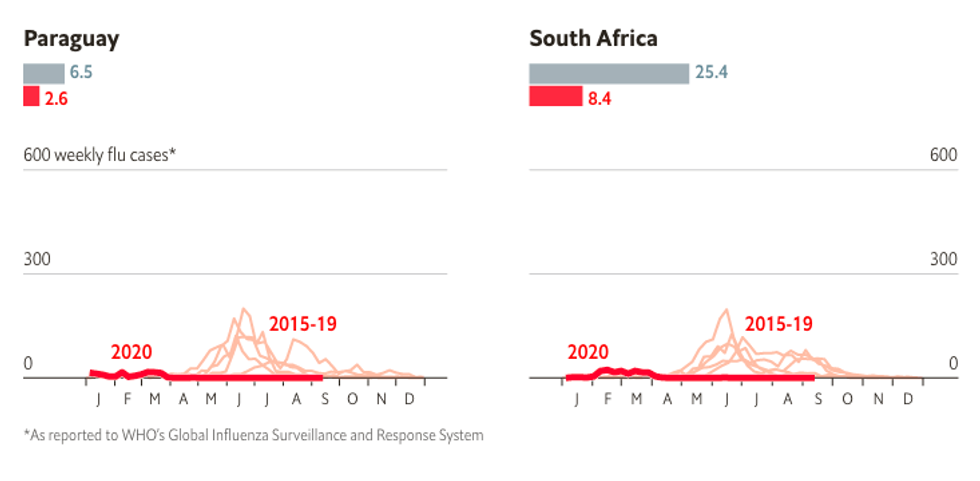

SUBSCRIBE TO OUR FREE NEWSLETTER
Daily news & progressive opinion—funded by the people, not the corporations—delivered straight to your inbox.
5
#000000
#FFFFFF
To donate by check, phone, or other method, see our More Ways to Give page.


Daily news & progressive opinion—funded by the people, not the corporations—delivered straight to your inbox.

A man wearing a face mask boards a bus on August 31, 2020 in Auckland, New Zealand. Face coverings are now compulsory for all New Zealanders over the age of 12 on public transport or planes under current Alert Level restrictions in place across the country. The country's record-low rates of influenza during its winter months this year have signaled that Covid-19 restrictions are helping to prevent flu outbreaks and the overwhelming of health systems. (Photo: Hannah Peters/Getty Images)
An unusually low rate of influenza infections in the Southern Hemisphere during the region's winter months this year suggests that Covid-19 restrictions are working to ensure health systems aren't overwhelmed with both flu and coronavirus patients, public health experts said Thursday.
In countries including New Zealand, Australia, South Africa, and Chile, public health officials have been stunned this year by historically low flu infection and mortality rates--in news that potentially bodes well for the Northern Hemisphere as winter approaches.
"It's amazing. There's just nothing there at all. No influenza," Michael Baker, professor of public health at the University of Otago in Wellington, New Zealand, told The Guardian.
Doctors in New Zealand have detected zero influenza cases since they began screening patients in June. More than half of patients who were tested at the same time last year tested positive.
In Australia, government data shows 315 flu cases were detected in July and August, compared with more than 131,000 cases last winter. Fewer than 40 Australians have died this year of the illness.
"There haven't been any deaths [from the flu] for the past three to four months," Professor Ian Barr, an influenza expert at the World Health Organization, told The Guardian.
The data from public health officials in the south is the "best news in quite a while," said Dan O'Brien, chief economist at the Institute of International and European Affairs.
The Economist published several graphs showing this year's nearly non-existent flu season in the Southern Hemisphere.


The news comes as public health officials in the north have been bracing for an especially deadly flu season this fall and winter, with a potential increase in Covid-19 cases compounded by influenza outbreaks.
"This is hopefully a good indicator for our hospital system this winter," tweeted Peter Tanham, co-founder of Nimble Metrics, a data analytics firm in Ireland. "There has been virtually no flu in [the] Southern Hemisphere during lockdown. If we all keep up precautions and get the flu vaccine it could make [a] significant impact on hospital capacity."
Australia and New Zealand have imposed relatively stringent public health guidelines to prevent the spread of Covid-19 as the world waits for an effective vaccine.
New Zealand has one of the world's lowest rates of Covid-19 infection, and its Covid-19 alert level is currently at Level 2, with residents required to wear face coverings on public transit and urged to use them in daily life when social distancing is not possible. In Australia, the government is still imposing restrictions on public gatherings.
According to The Guardian, "even relatively less stringent quarantines appear to be surprisingly potent at suppressing influenza and other common respiratory illnesses."
South Africa and several Latin American countries where restrictions have been less aggressively enforced have reported far fewer flu cases this year than in previous years.
Baker expressed hope that countries in the Northern Hemisphere take note of the "positive side effect" of Covid-19 restrictions, including wearing masks in public.
With some level of restrictions, "you would still see a flu season, but I expect it would be much less intense," Baker told The Guardian. "Northern Hemisphere countries that are actively suppressing Covid-19 to some degree should get a lot of protection [from influenza] by doing that."
Dear Common Dreams reader, The U.S. is on a fast track to authoritarianism like nothing I've ever seen. Meanwhile, corporate news outlets are utterly capitulating to Trump, twisting their coverage to avoid drawing his ire while lining up to stuff cash in his pockets. That's why I believe that Common Dreams is doing the best and most consequential reporting that we've ever done. Our small but mighty team is a progressive reporting powerhouse, covering the news every day that the corporate media never will. Our mission has always been simple: To inform. To inspire. And to ignite change for the common good. Now here's the key piece that I want all our readers to understand: None of this would be possible without your financial support. That's not just some fundraising cliche. It's the absolute and literal truth. We don't accept corporate advertising and never will. We don't have a paywall because we don't think people should be blocked from critical news based on their ability to pay. Everything we do is funded by the donations of readers like you. Will you donate now to help power the nonprofit, independent reporting of Common Dreams? Thank you for being a vital member of our community. Together, we can keep independent journalism alive when it’s needed most. - Craig Brown, Co-founder |
An unusually low rate of influenza infections in the Southern Hemisphere during the region's winter months this year suggests that Covid-19 restrictions are working to ensure health systems aren't overwhelmed with both flu and coronavirus patients, public health experts said Thursday.
In countries including New Zealand, Australia, South Africa, and Chile, public health officials have been stunned this year by historically low flu infection and mortality rates--in news that potentially bodes well for the Northern Hemisphere as winter approaches.
"It's amazing. There's just nothing there at all. No influenza," Michael Baker, professor of public health at the University of Otago in Wellington, New Zealand, told The Guardian.
Doctors in New Zealand have detected zero influenza cases since they began screening patients in June. More than half of patients who were tested at the same time last year tested positive.
In Australia, government data shows 315 flu cases were detected in July and August, compared with more than 131,000 cases last winter. Fewer than 40 Australians have died this year of the illness.
"There haven't been any deaths [from the flu] for the past three to four months," Professor Ian Barr, an influenza expert at the World Health Organization, told The Guardian.
The data from public health officials in the south is the "best news in quite a while," said Dan O'Brien, chief economist at the Institute of International and European Affairs.
The Economist published several graphs showing this year's nearly non-existent flu season in the Southern Hemisphere.


The news comes as public health officials in the north have been bracing for an especially deadly flu season this fall and winter, with a potential increase in Covid-19 cases compounded by influenza outbreaks.
"This is hopefully a good indicator for our hospital system this winter," tweeted Peter Tanham, co-founder of Nimble Metrics, a data analytics firm in Ireland. "There has been virtually no flu in [the] Southern Hemisphere during lockdown. If we all keep up precautions and get the flu vaccine it could make [a] significant impact on hospital capacity."
Australia and New Zealand have imposed relatively stringent public health guidelines to prevent the spread of Covid-19 as the world waits for an effective vaccine.
New Zealand has one of the world's lowest rates of Covid-19 infection, and its Covid-19 alert level is currently at Level 2, with residents required to wear face coverings on public transit and urged to use them in daily life when social distancing is not possible. In Australia, the government is still imposing restrictions on public gatherings.
According to The Guardian, "even relatively less stringent quarantines appear to be surprisingly potent at suppressing influenza and other common respiratory illnesses."
South Africa and several Latin American countries where restrictions have been less aggressively enforced have reported far fewer flu cases this year than in previous years.
Baker expressed hope that countries in the Northern Hemisphere take note of the "positive side effect" of Covid-19 restrictions, including wearing masks in public.
With some level of restrictions, "you would still see a flu season, but I expect it would be much less intense," Baker told The Guardian. "Northern Hemisphere countries that are actively suppressing Covid-19 to some degree should get a lot of protection [from influenza] by doing that."
An unusually low rate of influenza infections in the Southern Hemisphere during the region's winter months this year suggests that Covid-19 restrictions are working to ensure health systems aren't overwhelmed with both flu and coronavirus patients, public health experts said Thursday.
In countries including New Zealand, Australia, South Africa, and Chile, public health officials have been stunned this year by historically low flu infection and mortality rates--in news that potentially bodes well for the Northern Hemisphere as winter approaches.
"It's amazing. There's just nothing there at all. No influenza," Michael Baker, professor of public health at the University of Otago in Wellington, New Zealand, told The Guardian.
Doctors in New Zealand have detected zero influenza cases since they began screening patients in June. More than half of patients who were tested at the same time last year tested positive.
In Australia, government data shows 315 flu cases were detected in July and August, compared with more than 131,000 cases last winter. Fewer than 40 Australians have died this year of the illness.
"There haven't been any deaths [from the flu] for the past three to four months," Professor Ian Barr, an influenza expert at the World Health Organization, told The Guardian.
The data from public health officials in the south is the "best news in quite a while," said Dan O'Brien, chief economist at the Institute of International and European Affairs.
The Economist published several graphs showing this year's nearly non-existent flu season in the Southern Hemisphere.


The news comes as public health officials in the north have been bracing for an especially deadly flu season this fall and winter, with a potential increase in Covid-19 cases compounded by influenza outbreaks.
"This is hopefully a good indicator for our hospital system this winter," tweeted Peter Tanham, co-founder of Nimble Metrics, a data analytics firm in Ireland. "There has been virtually no flu in [the] Southern Hemisphere during lockdown. If we all keep up precautions and get the flu vaccine it could make [a] significant impact on hospital capacity."
Australia and New Zealand have imposed relatively stringent public health guidelines to prevent the spread of Covid-19 as the world waits for an effective vaccine.
New Zealand has one of the world's lowest rates of Covid-19 infection, and its Covid-19 alert level is currently at Level 2, with residents required to wear face coverings on public transit and urged to use them in daily life when social distancing is not possible. In Australia, the government is still imposing restrictions on public gatherings.
According to The Guardian, "even relatively less stringent quarantines appear to be surprisingly potent at suppressing influenza and other common respiratory illnesses."
South Africa and several Latin American countries where restrictions have been less aggressively enforced have reported far fewer flu cases this year than in previous years.
Baker expressed hope that countries in the Northern Hemisphere take note of the "positive side effect" of Covid-19 restrictions, including wearing masks in public.
With some level of restrictions, "you would still see a flu season, but I expect it would be much less intense," Baker told The Guardian. "Northern Hemisphere countries that are actively suppressing Covid-19 to some degree should get a lot of protection [from influenza] by doing that."